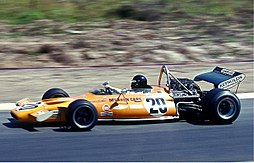
Denis Clive Hulme was a New Zealand racing driver who won the 1967 Formula One World Drivers' Championship for the Brabham team. Between his debut at Monaco in 1965 and his final race in the 1974 US Grand Prix, he started 112 Grands Prix, resulting in eight victories and 33 podium finishes. He also finished third in the overall standing in 1968 and 1972.

Peter Jeffrey Revlon Revson was an American race car driver and heir to the Revlon cosmetics fortune. He was the Can-Am Champion for the 1971 season, and finished fifth overall in the World Drivers' Championship for both the 1972 and 1973 Formula One seasons.

The 1972 South African Grand Prix, formally the Sixth AA Grand Prix of South Africa, was a Formula One motor race held at Kyalami on 4 March 1972. It was race 2 of 12 in both the 1972 World Championship of Drivers and the 1972 International Cup for Formula One Manufacturers. The 79-lap race was won by McLaren driver Denny Hulme after he started from fifth position. Emerson Fittipaldi finished second for the Lotus team and McLaren driver Peter Revson came in third.

The 1972 United States Grand Prix was a Formula One motor race held on October 8, 1972, at the Watkins Glen Grand Prix Race Course in Watkins Glen, New York. It was race 12 of 12 in both the 1972 World Championship of Drivers and the 1972 International Cup for Formula One Manufacturers. The 59-lap race was won by Tyrrell driver Jackie Stewart after he started from pole position. His teammate François Cevert finished second and McLaren driver Denny Hulme came in third. This was the debut race of the future world champion Jody Scheckter.
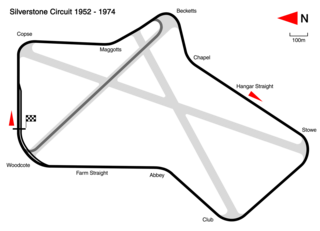
The 1973 British Grand Prix was a Formula One (F1) motor race held at Silverstone on 14 July 1973. It was race 9 of 15 in both the 1973 World Championship of Drivers and the 1973 International Cup for Formula One Manufacturers. The race is known for the first lap pile-up, which ultimately caused eleven cars to retire. The accident happened when Jody Scheckter, running fourth in his McLaren, spun across the track at Woodcote Corner at the end of the first lap, causing many other cars to collide and crash. The incident eliminated nine cars, including all three works Surtees cars, while Brabham driver Andrea de Adamich suffered a broken ankle that ended his F1 career. The race was stopped at the end of the second lap, before being restarted over the original 67-lap distance with 18 of the original 29 cars. David Purley and Graham McRae had retired in separate incidents.

The 1973 Canadian Grand Prix was a Formula One motor race held at Mosport Park on 23 September 1973. It was race 14 of 15 in both the 1973 World Championship of Drivers and the 1973 International Cup for Formula One Manufacturers.

The 1974 Argentine Grand Prix was a Formula One motor race held in Buenos Aires on 13 January 1974. It was race 1 of 15 in both the 1974 World Championship of Drivers and the 1974 International Cup for Formula One Manufacturers. The 53-lap race was won by McLaren driver Denny Hulme after he started from tenth position. Niki Lauda finished second for the Ferrari team and his teammate Clay Regazzoni came in third.

The 1974 German Grand Prix was a Formula One motor race held at the Nürburgring on 4 August 1974. It was race 11 of 15 in both the 1974 World Championship of Drivers and the 1974 International Cup for Formula One Manufacturers. It was the 36th German Grand Prix and the 33rd to be held at the Nürburgring complex of circuits. The race was won by Swiss driver Clay Regazzoni driving a Ferrari 312B3. Regazzoni led every lap on the way to his second Grand Prix victory, some four years after his debut victory at the 1970 Italian Grand Prix. South African driver Jody Scheckter was second driving a Tyrrell 007 ahead of Argentine driver Carlos Reutemann.

The 1974 United States Grand Prix was a Formula One motor race held on October 6, 1974, at the Watkins Glen Grand Prix Race Course in Watkins Glen, New York. It was race 15 of 15 in both the 1974 World Championship of Drivers and the 1974 International Cup for Formula One Manufacturers.
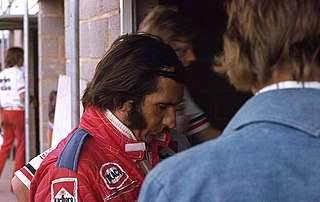
The 1974 Formula One season was the 28th season of FIA Formula One motor racing. It featured the 1974 World Championship of F1 Drivers and the 1974 International Cup for F1 Manufacturers, contested concurrently over a fifteen-race series which commenced on 13 January and ended on 6 October. The season also included three non-championship races.
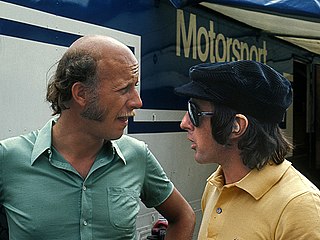
The 1973 Formula One season was the 27th season of FIA Formula One motor racing. It featured the 1973 World Championship of Drivers and the 1973 International Cup for F1 Manufacturers, which were contested concurrently over a fifteen-race series that commenced on 28 January and ended on 7 October. The season also included two non-championship races which were open to both Formula One and Formula 5000 cars.

The 1972 Formula One season was the 26th season of the FIA's Formula One motor racing. It featured the 23rd World Championship of Drivers, the 15th International Cup for F1 Manufacturers, and numerous non-championship Formula One races. The World Championship season commenced on 23 January and ended on 8 October after twelve races.

The 1971 Formula One season was the 25th season of the Fédération Internationale de l'Automobile's Formula One motor racing. It featured the 22nd World Championship of Drivers, the 14th International Cup for F1 Manufacturers and a number of non-championship races open to Formula One cars. The World Championship was contested over eleven races between 6 March and 3 October.

The 1968 Formula One season was the 22nd season of the FIA's Formula One motor racing. It featured the 19th World Championship of Drivers, the 11th International Cup for F1 Manufacturers, and three non-championship races open to Formula One cars. The World Championship was contested over twelve races between 1 January and 3 November 1968.

The 1967 Formula One season was the 21st season of FIA Formula One motor racing. It featured the 18th World Championship of Drivers, the 10th International Cup for F1 Manufacturers, and six non-championship races open to Formula One cars. The World Championship was contested over eleven races between 2 January and 22 October 1967.

Peter Kenneth Gethin was a British racing driver from England. He participated in 31 World Championship Formula One Grands Prix, debuting on 21 June 1970. He won the 1971 Italian Grand Prix, this race stood as the fastest-ever Formula One race for 32 years, until the 2003 Italian Grand Prix at Monza, this was Gethin's only podium finish. Gethin also participated in numerous non-Championship Formula One races, winning the 1971 World Championship Victory Race and the 1973 Race of Champions.

The McLaren M23 was a Formula One racing car designed by Gordon Coppuck, with input from John Barnard, and built by the McLaren team. It was a development of the McLaren M16 Indianapolis 500 car. A Ford Cosworth DFV engine was used, which was prepared by specialist tuning company Nicholson-McLaren Engines. This helped push the DFV's horsepower output to around 490 bhp.
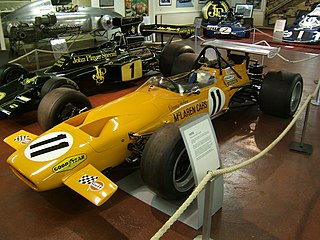
The McLaren M14A is a Formula One racing car built and raced by McLaren in the 1970 World Championship and the 1971 World Championship. A later extension, the McLaren M14D featured a V8 Alfa Romeo engine.

The 19th International Gold Cup was a non-championship Formula One race, which was held on the Oulton Park circuit, located near Tarporley, Cheshire, England on 29 May 1972.

There have been ten Formula One drivers from New Zealand, with four of them having started two or fewer races. The late 1950s to mid-1970s is viewed as the "golden age" for New Zealand in the sport and saw Denny Hulme crowned as World Drivers' Championship in 1967. New Zealand drivers were absent from Formula One events from 1984 to 2017.
